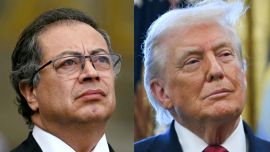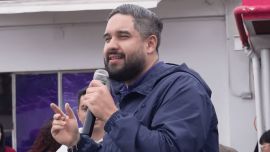Eight Argentina teams have to date secured a place i n t he 2020 O l y m p i c G a m e s . When the action kicks off in Tokyo a host of Lions, Lionesses, Gladiators, Pumas and Panthers will be there to represent their nation, gunning towards the ultimate goal of a gold medal. A rgentina’s footballers now become the latest side to try and book their ticket to Japan, with the Pre-Olympic Qualifying tournament kicking off today in Colombia as the first step on a long, arduous quest for glory.
Fernando Batista’s Under-23 squad – players’ ages are restricted in both qualifying and the Games itself, although in the latter, three overage footba l lers a re allowed to participate – kick off their Group A campaign against the hosts, while Venezuela, Ecuador and Chile complete what looks on paper at least an extremely difficult first phase for the Albiceleste. Just two teams from each five-nation group will qualify for the final stage, which will ultimately yield two qualifiers for Tokyo by February 9.
Making the cut will be no easy task, with games coming thick and fast over the next three weeks and giving precious little time for players either to regain peak condition following the summer break or indeed to recover b e t w e e n m a t c h e s . I n Argentina’s favour, however, Batista has been meticulous in his preparations, so often an Achilles heel for national teams. The former Argentinos Juniors youth coach was thrown in at the deep end with the Under-20s just one year ago, but has used his time in charge to mould a stable group of kids who have played together consistently for the best part of 12 months.
Argentina were desperately unlucky to go out of the 2019 U-20 World Cup in the last 16, losing on penalties to Mali after conceding a lastminute equaliser, but bounced back to romp to gold in the Panamerican Games thanks to a 4-1 thrashing of Honduras. Subsequent friendly results have been largely positive, but perhaps most important is the fact they have been played at all, shedding the improvisation and lack of planning that has dogged the Albiceleste at youth level for years.
“We are more organised and calm now,” Batista admitted to TyC Sports in a recent interview. “We are going to try to play well in the PreOlympics. I separate playing wel l f rom play i ng n ice football: I don’t have a problem if my team has to get rid of possession with a long ball. But I like to give [the players] the chance to play the ball.”
With the likes of Lautaro Martínez – eligible to play in Colombia by age but not given clearance to travel by club Inter – missing in the upcoming tournament, Batista will put his faith on the group of players that took him through both the World Cup and Panamerican Games.
Key to Argentina’s chances will be the potent forward partnership of Adolfo Gaich and Fernando Valenzuela. The pair come across as the classic ‘big man, little man’ dynamic, but with a twist: San Lorenzo forward Gaich is no slouch when it comes to technique, while Valenzuela – a former youth prodigy with Racing and now lighting up the Primera Nacional in the colours of Barracas Central – is an exquisite playmaker who nevertheless has no problem with squaring up to his marker; in the words of Batista, “he has the potrero inside of him, and that is something which has become scarce in this country.”
Elsewhere on the field the
likes of captain and defensive
enforcer Nehuen Pérez, Boca
Juniors playmaker Alexis MacAllister and Racing midfielder Matias Zaracho will all
hope to play a big part in the
Albiceleste’s campaign to
reach Tokyo. But it will ultimately be the collective ability of
the team as a whole that decides the fate of this Olympic bid
– and in that sense Argentina
have left no stone unturned in
their bid to do things right
ahead of the qualifiers.related news





















Comments